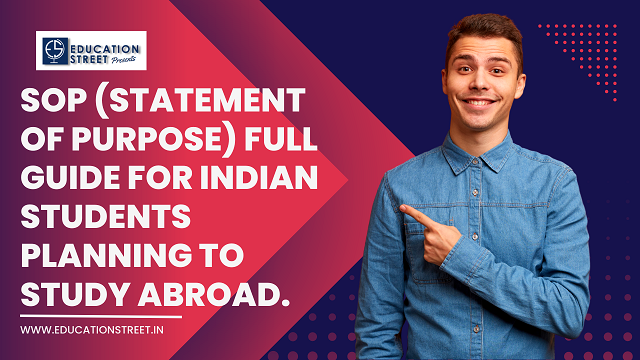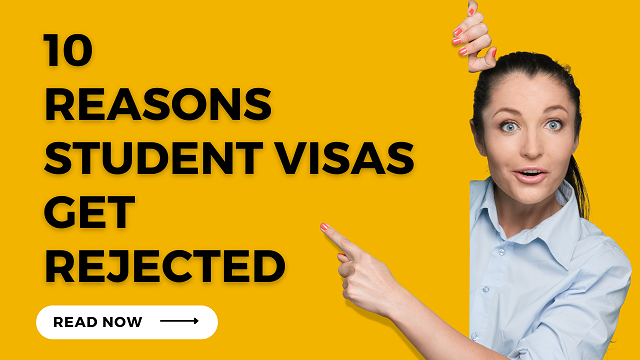You must comprehend as a candidate that obtaining a study visa differs from receiving an offer letter from an institution. Studying abroad at a university has the potential to transform lives. You experience cultural variety and inclusivity while expanding your professional network and improving your career prospects. The advantages of studying abroad are unparalleled. An international degree, however, is not easy to obtain.
Potential applicants for student visas take a variety of actions to obtain their visa stamped right away. The most crucial document you’ll need to enroll in a program of study abroad is a student visa. After you obtain an offer letter from your chosen university in your chosen nation, the visa stamping process begins. Possible justifications for attending a specific university are listed on the visa application.
Here are some faults you should avoid if you wish to increase your selection chances:
-
Incomplete application or documents
It is crucial that you correctly complete every area of the application form when applying for a study visa. You must offer accurate, comprehensive, and true information. Do not omit any sections. Before entering any information, carefully read each instruction because what may apply to someone else may not apply to you. A visa application that is incomplete risked being rejected. Avoid misspellings and other inconsistencies with your documents.
-
Insufficient research
It is shocking to see how little research students undertake on the college, course, and nation they choose. Some of them don’t know enough about where university campuses are. Giving evasive responses to these inquiries during interviews is another important factor in denial.
Students must get ready to at least inform the interviewer on the fundamentals of the school, the courses and career alternatives available to them, the associated costs, etc. Before applying for the visa, individuals must show that they did their research.
-
Absence of sufficient funding
The applicant for a student visa must be able to cover the first academic year’s tuition. Additionally, the applicant must show that they are capable of handling their funds and meeting the nation’s minimum requirements.
You must provide genuine financial papers that indicate you have the money to cover the charges; providing a bank statement that shows a sizable transfer of funds prior to submitting your visa application may cast doubt on the funds’ source and whether they are intended purely for educational purposes. Parent sponsors who hold low-paying jobs could also cause suspicion. Make sure your financial history is unblemished and sufficient to get you a visa.
-
Missing documents
Some students fail to provide or present required documentation, including IELTS, TOEFL, GRE results, scholarship confirmations, and sponsor bank statements. You can find yourself on the wrong side of the visa decision if you make this risky error. Even while temporary refusals are frequently the result of these circumstances, the consulate occasionally exhibits extreme rigor and is less forgiving of these careless errors.
-
Documents not adhering to visa standards
It is crucial to be sincere in both your speaking and your presentation.
It is essential to be completely honest about yourself, your plans to study in the nation of your choice, and the employment prospects you anticipate after completing your studies. You must also state if you plan to stay or go back to your country of origin. No of how it affects your application, if you supply inaccurate information (either purposefully or unintentionally), you run the risk of having it rejected and losing the opportunity to reapply for the same position.
-
Immigration history
Unbelievably, the success of your application for a student visa depends on your immigration history. Your visa application could be harmed if your paperwork in any way hints at immigration offenses in any nation. The reliability and sincerity of each application are evaluated by visa officers; a problematic immigration background raises suspicions.
-
Failure to apply on time
The beginning and ending dates for application submission must be known by applicants. An incomplete application will be rejected outright.
There is a good likelihood that early candidates will be accepted.
Late submissions are more likely to result in denial because visa officials have a large volume of applications to review.
-
Divided focus
Students must be upfront about their plans to study in a country when applying for a student visa. They ought to have some aspirations and plans for the future in relation to their area of study. Students who appear confused or who don’t provide enough information about their professional goals run the risk of being rejected.
-
Not giving much importance to visa interviews
A visa interview enables a visa officer to decide whether or not to grant the applicant a visa. Therefore, in order to fulfill their aspirations of studying abroad, applicants must succeed at this stage. Until you succeed, passing a visa interview is not difficult. You will experience rejection if you don’t perform well. A lot of questions are asked of you throughout the interview process so the interviewer can grasp your motivation for studying abroad. Most inquiries are about your education, your place of study or program, your financial backers, etc. Additionally, they will evaluate your English proficiency in order to approve you. Although none of the aforementioned issues are difficult, if you don’t do enough research and preparation, they could nevertheless jeopardize your application for a visa.
-
Taking assistance from unprofessional consultants
Seeking professional assistance is acceptable as long as they are qualified and knowledgeable about every aspect of the procedure.
Using unqualified immigration advisors’ services could result in rejection.
Every application is unique, therefore you should plan to work with someone who can give your case a personalized touch.
Because the consultant is not accredited, licensed, or prepared to handle such issues, many student visas are denied. Therefore, it is essential to exclusively engage with professional experts for advice and support.
Getting professional advice can help you breeze through VISA interviews and secure it with no trouble. To make your visa seamless, hassle-free, and successful join @educationstreet




